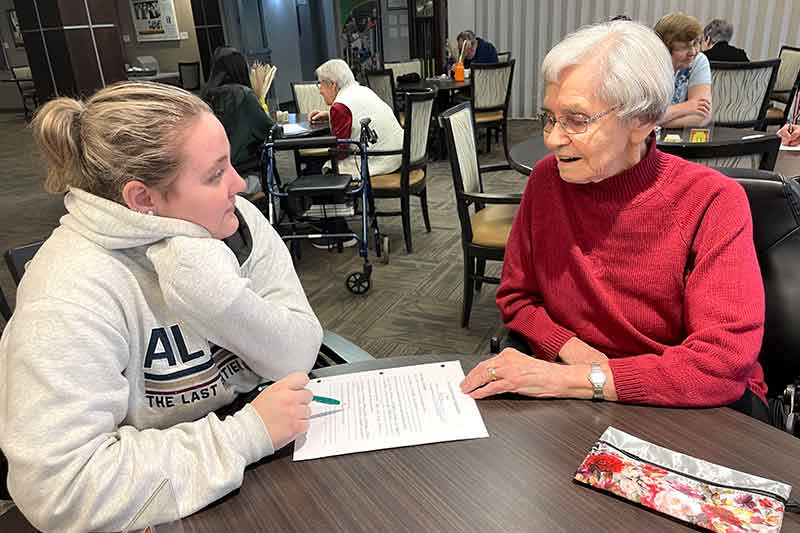A group of Gr. 11-12 students from W.C. Miller Collegiate has been learning all about history through a unique project initiated by human ecology teacher Jennifer Dyck.
Dyck’s Life Enrichment project has each of her 17 students paired up with a tenant from Altona’s Gardens on Tenth for monthly visits to learn more about how things used to be before all the high-tech trappings of modern life.
“I wanted something to bring my students out of their comfort zone because we find that high school students are always on their phone, but I don’t know if they actually know how to communicate with others,” Dyck said. “Since human ecology is about more than just cooking and sewing, I wanted to extend it to family dynamics as well.”
After connecting with Gardens events and activities coordinator Deandra Braun, Dyck was able to arrange regular visits between the students and their new senior friends.
“On the first day, all they did was interview their participants about their childhood, their adulthood and life as a senior citizen,” Dyck said. “Questions have included things like what is your most vivid childhood memory? Do you remember your wedding day? What kind of home did you live in? What kind of job did you have? What was your dream job? What is one valuable thing you learned in your life that you would pass on? It’s interesting how many of them noted the crowning of Queen Elizabeth as a significant thing that happened when they were a child.”
The most recent session last week was all about food.
“They baked four different kinds of cookies to share,” Dyck said, explaining the questions at that get-together had the seniors sharing their favourite foods and food-related memories and recalling the price of items when they were growing up.
Dyck says she hopes the kids really take these sessions to heart.
“They were kind of nervous that first time, but by the end of that session they were just chatting away. I want them to really connect with a generation that is vastly different from their own and relearn the art of communication. I want the students to know they’re learning from these tenants, but the tenants are also learning from them, to see how the generations have changed. These are really great kids, and I think they’ve had a great time with this project.”
The visits will continue until January, with future sessions focusing on clothing and mental health.
“Our final visit will just be a big celebration,” Dyck said. “The students are going to make a bunch of different types of food, and they’ll play games and celebrate their time together. Who knows? They may have formed long-term connections here.”
Student Selena Peters is partnered with Gardens tenant Ruth Peters for the project.
“I’ve really enjoyed these visits,” Selena said. “It’s been fun and insightful. I learned that the cost of food was way lower than it is now, and not everything was bought at the store. They grew a lot of their own food.”
Ruth said she’s had a wonderful time getting to know Selena.
“We’ve had some great conversations. I love sharing my memories and thinking back to the way things used to be. Too often we think the younger generation doesn’t care about these things, but I have found they’re very interested. I will miss Selena’s visits and I’ll have to ask her to come back and see me once in a while.”
Aurellia Peters says she loves talking to her project partner, Rose Hildebrand.
“I’ve learned that she loved to have homemade ice cream when she was younger, and I learned a lot about different recipes that she liked to make. She definitely produced more food in her garden than I have ever done, and she saved more money on groceries than my family does. Less eating out and a lot more homemade stuff. Rose is easy to talk to and we talk about Mennonite dishes and schmaunt fat and all that kind of stuff. I’m really looking forward to more sessions.”
Hildebrand feels the same way.
“Aurellia really takes an interest and wants to know all these things from way back. I am a historian so that helps. Talking to her brought back a lot of memories. I just finished writing about memories of my grandma, and I’ve written a book about history. History is important. If you don’t know where you’re coming from, you don’t know where you’re going. That’s a good lesson for the younger people too. She asked me some good questions. One question, what restaurant did my family go to, I drew a blank. I don’t remember any. But it’s been so fun going back down memory lane.”

